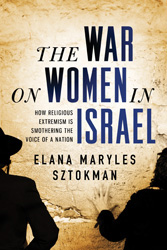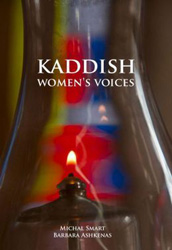Join a community of readers who are committed to Jewish stories
Sign up for JBC’s Nu Reads, a curated selection of Jewish books delivered straight to your door!
Posted by Nat Bernstein
We are all still reeling from the past weeks of terror and grief over the murders of Naftali Fraenkel, Gilad Shaar, Eyal Yifrah, three Jewish young men whose bodies were found in a field in the West Bank after an eighteen-day search following their kidnapping, and Muhammad Abu Khdeir, a sixteen-year-old Palestinian who was burned alive in a horrifying civilian act of retaliation.
It is hard, and it hardly seems appropriate, to find inspiration in the face of such tragedy, especially as the violence, division, and hatred behind it continue to promulgate in its wake. There was no small victory for humankind in this story, no miracle — but there was progress.
“The funeral ceremonies also included a seminal moment from a religious perspective, a personal moment with far-reaching public significance,” Yair Ettinger pointed out hours after the burial of the three Jewish victims, in an essay entitled “When Rachel Fraenkel Recited the Kaddish, the Chief Rabbi Said ‘Amen’” for Haaretz. “The recitation of the Mourner’s Kaddish by women is gaining momentum, particularly in Modern Orthodox communities. Although it has rabbinical approval, it has never had such great exposure as it had on Tuesday.”
 Indeed, 2014 – 2015 JBC Network author Elana Maryles Sztokman lists cemeteries and funerals among the worst examples of public gender segregation in Israel in the opening chapter of her current book, The War on Women in Israel: How Religious Extremism is Smothering the Voice of a Nation. “One of the most painful experiences of women’s exclusion,” she writes, “takes place at the cemetery, where women are increasingly barred from their own mourning processes… For perhaps obvious reasons, women who were prevented from saying eulogies or honoring their deceased loved ones at funerals faced significant emotional struggles.”
Indeed, 2014 – 2015 JBC Network author Elana Maryles Sztokman lists cemeteries and funerals among the worst examples of public gender segregation in Israel in the opening chapter of her current book, The War on Women in Israel: How Religious Extremism is Smothering the Voice of a Nation. “One of the most painful experiences of women’s exclusion,” she writes, “takes place at the cemetery, where women are increasingly barred from their own mourning processes… For perhaps obvious reasons, women who were prevented from saying eulogies or honoring their deceased loved ones at funerals faced significant emotional struggles.”
Thankfully — and significantly — that added distress was not placed on Rachel Fraenkel, the bereft mother of Naftali, as she buried her sixteen-year-old son. She was not edged out of public view or ushered away from her son’s graveside; she stood together with her family and recited the Mourner’s Kaddish in front of Chief Rabbi David Lau, religious leaders and members of Knesset, and the thousands of Jews who assembled at the cemetery, and the only response she received was “Amen.”
“The religious feminist movement is not new,” Ettinger asserts in his article. “It has been taking shape for many years with the full cooperation of high-ranking Orthodox rabbis, but it is not every day that it gets the kind of exposure engendered by a woman’s public recitation of Kaddish.”
 Several months ago, 2014 – 2015 JBC Network authors Michal Smart and Barbara Ashkenas received a 2013 National Jewish Book Award for their co-edited anthology, Kaddish: Women’s Voices, in which over fifty writers from around the world — including Nessa Rapaport and fellow 2014 – 2015 JBC Network author and 2013 National Jewish Book Award recipient Chaya R. Gorsetman, who coauthored Educating in the Divine Image: Gender Issues in Orthodox Jewish Day Schools with Sztokman — share their experiences mourning as Jewish women. “I hope this book will serve as a companion to others,” Ashkenas writes in the preface, “spark many meaningful conversations, and open the possibilities for women to choose how to mourn and remember a loved one.”
Several months ago, 2014 – 2015 JBC Network authors Michal Smart and Barbara Ashkenas received a 2013 National Jewish Book Award for their co-edited anthology, Kaddish: Women’s Voices, in which over fifty writers from around the world — including Nessa Rapaport and fellow 2014 – 2015 JBC Network author and 2013 National Jewish Book Award recipient Chaya R. Gorsetman, who coauthored Educating in the Divine Image: Gender Issues in Orthodox Jewish Day Schools with Sztokman — share their experiences mourning as Jewish women. “I hope this book will serve as a companion to others,” Ashkenas writes in the preface, “spark many meaningful conversations, and open the possibilities for women to choose how to mourn and remember a loved one.”
Since Naftali Fraenkel , Gilad Shaar, Eyal Yifrah’s disappearance, the entire Jewish world has been watching — watching for developments in the case, watching the bereaved families, watching for the responses of Jewish, Arab, and world leaders, watching the citizens of Israel and the Palestinian territories. This process of waiting and, eighteen days later, confirmed grief, and later still shock and horror at the discovery of Muhammad Abu Khdeir’s brutalized body — for we are all, regardless of our politics or opinions, saddened by the senseless deaths of these youths — has elicited discussion within the Jewish community, albeit a painful one. We don’t know what to talk about, and so we resort to either sitting in an unhealthy silence or reacting in ways that harm others, harm our standing as a nation in the global community, and harm our own friends and dear ones.
Yair Ettinger’s piece points us to one way in which we might create a constructive conversation, both in the immediate aftermath of this terrible event and for the months and years to follow, for our communities: a discussion of healing, of Jewish practice, of women and religion, of a way forward.
Nat Bernstein is the former Manager of Digital Content & Media, JBC Network Coordinator, and Contributing Editor at the Jewish Book Council and a graduate of Hampshire College.